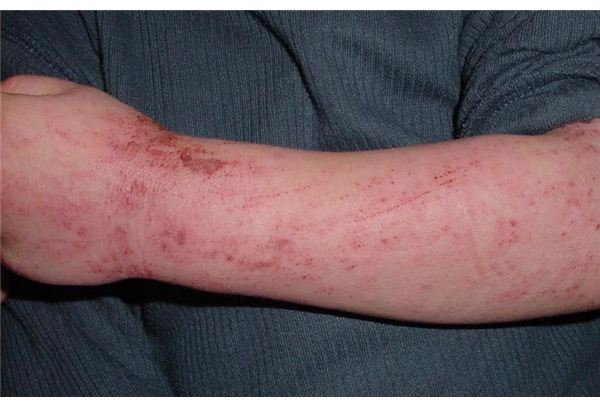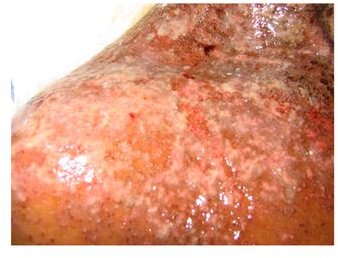Eczema Herpeticum: Treatment, Symptoms, Diagnosis
Description
Eczema herpeticum is a rare complication to a number of common skin conditions (usually atopic dermatitis). It is caused when a viral infection develops at the site of the pre-existing condition. The herpes simplex virus is the most frequent cause of the infection. Although this skin disease often resolves without further complication, all but a very mild case is considered a medical emergency because the patient is especially susceptible to a superinfection.
Also known as Kaposi varicelliform eruption (KVE), the disease is not gender specific and can occur at any age. A typical case lasts about 16 days, but it can continue for up to 6 weeks. It sometimes recurs but later episodes are generally not as severe as the initial one. In severe cases, the lesions may leave scars.
Image: PloS Medicine (Creative Commons)
Causes

There is always a pre-existing dermatological condition before the viral infection. This is most commonly atopic dermatitis (see image), but several other conditions have been reported to precede the infection as well. The common feature is that the epidermis is damaged by either disease (atopic or seborrheic dermatitis, pemphigus, others), or injury (2nd degree burns, skin grafts, sunburn, other) leaving it vulnerable to infection.
Once the epidermis is damaged, then a number of viral infections can occur. By far the most common is the herpes simplex virus (type 1 or 2). This is the virus responsible for cold sores and genital herpes. Less frequently, the viral infection has been caused by coxsackie or vaccinia viruses.
Image: Wikimedia (Creative Commons)
Symptoms
The first symptoms is a rash with clusters of small blisters. Many of the blisters will have a characteristic indentation in the dome. The rash is often accompanied by a fever and general malaise. It can remain localized to the area of the pre-existing dermititis, or it can become widespread, even covering the entire body. As it progresses the vesicles become pus filled and, if not controlled, can become crusty and bleed.
Complications
If the infection spreads to the eyes, scarring can occur that can lead to blindness.
Although the infection can remain localized, it can also become systemic and can involve a number of internal organs. The patient could become septic. Aggressive treatment will be required if this life-threatening condition occurs.
Another rare, but potentially fatal, complication is that of a superinfection. The risk of superinfection is especially high if the rash is disseminated (covers a wide area). In this case, what began as a common skin rash becomes complicated by an infection after exposure to a common virus (usually herpes simplex). The large areas of open vesicles leave the skin tissues vulnerable to yet another infection - usually caused by the bacteria S. Aureus. This patient will be extremely ill and if the bacterial infection involves a resistant strain, successful treatment will be very difficult
Diagnosis
Eczema Herpeticum is often suspected on the basis of the umbilicated (has an indentation that looks like a naval) pus filled vesicles that occur after the onset of the original atopic dermatitis. Because of the potential for severe complication, the physician will probably do viral cultures of the fluid from the blisters, and possibly a biopsy of a small piece of the infected skin.
Unfortunately, treatment is often delayed because the earliest symptoms are confused with the symptoms of the underlying skin condition.
Treatment
The treatment of choice against the herpes virus is the antiviral drug acyclovir (Zovirax). This medication cannot cure the infection but it will slow its progression and spread and allow the patient’s own body to fight the infection. It can also reduce the symptoms.
Because it is important to control the illness as quickly as possible, acyclovir may be prescribed as soon as eczema herpeticum is suspected, even before it is confirmed by laboratory results. Oral acyclovir may be used in mild cases, but IV administration will be required in more serious infections
In all but the most mild cases, an antibiotic will probably be prescribed as a preventative measure, even in the absence of a bacterial infection, because of the risk of a superinfection developing.
Additional information
Eczema is often misspelled as excema or exzema. It comes from the Greek word ekzema which means “to erupt”.
Herpeticum references the fact that the most common cause is infection with the herpes virus.
Resources
Fleming J, Lynn WA, 2004 A 33-Year-Old Man with a Facial Rash. PLoS Med 1(2): e17. doi:10.1371/journal.pmed.0010017
Kaposi Varicelliform Eruption: eMedicine Dermatology https://emedicine.medscape.com/article/1132622-overview
